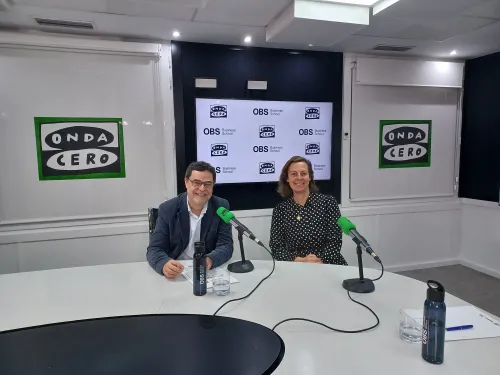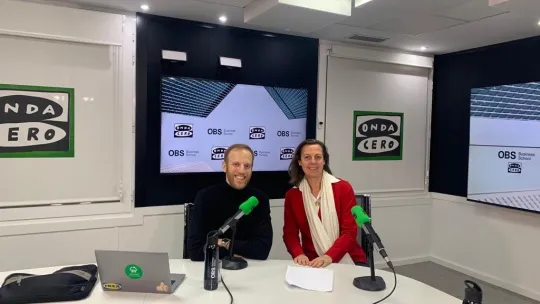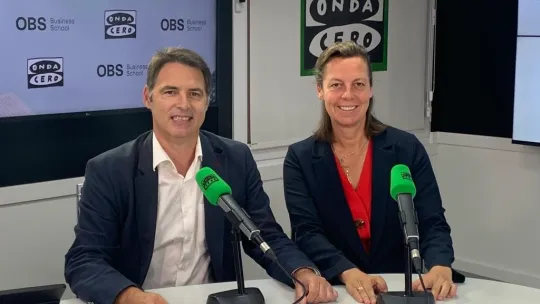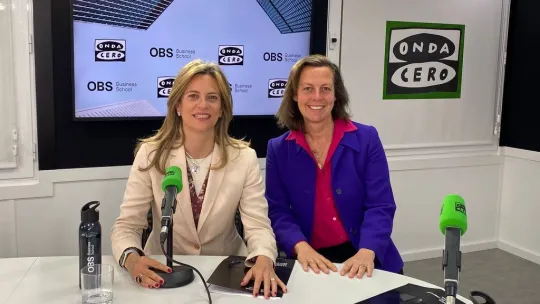
Executive Meeting with Miquel Campmany
Building purposeful brands: a major challenge for the FMCG sector
OBS Business School has held its II Executive Meeting of 2024 with the participation of Miquel Campmany, Marketing Capability Manager and Consumer Communication Head of Nestlé. At the meeting, together with Dr. Casilda Güell, Dean of OBS, Campmany analysed the advances in the food sector in terms of marketing, a sector that has shown its importance and that is suffering enormous stress due to inflation.
Over the last ten years, changes have been enormous in all areas, but those in the field of food have been huge, as Miquel Campmany describes them: "The digital explosion and the emergence of new channels have radically changed the way we relate to consumers". And he believes that only with permanent innovation can the quality of food be maintained, especially when it is produced on a large scale. He also stresses the importance of being able to explain to consumers the enormous difficulty involved. According to him, it is not only a question of ensuring that the nutritional profile of food is improved every day, but also of making it more pleasing to consumers, which is very subjective, and this involves improving the flavours and organoleptic qualities of the products.
Sustainability is a factor that is clearly shaping the we make food, and Nestlé has been working on it for more than ten years. However, according to Campmany, it doesn't come cheap: "It requires investment in factories and also in the supply chain," he says.
Marketing in the food sector
Miquel Campmany talks about creating brands with purpose; brands that, beyond describing a product, seek to leave a mark on society. However, "we are experiencing a fierce fight between manufacturers and distributors to make their products relevant", he says, and therefore it is vital to educate from kindergarten to enrich consumers' criteria.
"Building a brand in this sector means finding different ways of innovating, because this is the only way to guarantee a certain sustainability of the means of food we have," Campmany assures us. He gives the example of vegetable protein products, one of the most promising avenues for development.
Marketing programmes in the sector do not always produce results in the short term, he explains, and gives as an example the case of Maxibon, the ice cream that has become a reference for teenagers and which is behind extensive work to combat bullying among young people. Other campaigns, however, do produce immediate results, and are those that appeal to "proximity". For example, those carried out with cereal porridges from local crops.
New marketing trends
On new trends in marketing, Miquel Campmany talks about data, which all companies are pursuing. And for him it has no value if it is not analysed correctly. For this reason, he believes it is essential to have the best consumer and psychology experts to help us obtain correct information.
As for the emergence of "influencers", Campmany considers them to be an important element in brand strategy, but only if they are used correctly. "It's not a case of one size does not fit all," he says. In order to give a voice to an influencer about a specific brand, he considers it essential that they have a point of connection with it, or that they share the same target audience, or that they talk about the same subject matter, or even that they are close to the brand's products. "Just because you have a lot of followers does not justify an influencer becoming the spokesperson for your brand," he says. And he believes that the professional associations that regulate them should find a balance to ensure that this tool is sustainable over time.
For Campmany, AI is not just another fad. He sees it as a tool that will simplify some tasks and free up our time for analysis and perspective. In the food sector in particular, he believes it can add value not only in the output (visual themes, designs, etc.) but above all at the start of processes. "AI will help us to sort, classify and understand the information that comes to us through digital channels, which is immense," he confirms.
What does the future hold?
Nestlé has a medical and even hospital division to anticipate long-term trends: Nestlé Health Science. It is already working on different alternatives in the food field, including major nutrients, but also micronutrients, which we will probably have to learn to consume differently, and which will serve as a supplement for certain deficiencies. "Of course, Nestlé will also continue to develop products that help us to continue to enjoy the little moments," concludes Miquel Campmany.





